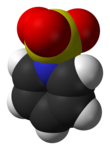Sulfur trioxide pyridine complex
Appearance
| |||
| Identifiers | |||
|---|---|---|---|
3D model (JSmol)
|
|||
| ChemSpider | |||
| ECHA InfoCard | 100.043.334 | ||
PubChem CID
|
|||
CompTox Dashboard (EPA)
|
|||
| |||
| |||
| Properties | |||
| C5H5NSO3 | |||
| Molar mass | 159.16 g/mol | ||
| Appearance | white solid | ||
Except where otherwise noted, data are given for materials in their standard state (at 25 °C [77 °F], 100 kPa).
| |||
Sulfur trioxide pyridine complex is the compound with the formula C5H5NSO3. It is a colourless solid that dissolves in polar organic solvents. It is the adduct formed from the Lewis base pyridine and the Lewis acid sulfur trioxide. The compound is mainly used as a source of sulfur trioxide, for example in the synthesis of sulfate esters from alcohols:[1]
- ROH + C5H5NSO3 → [C5H5NH]+[ROSO3]−
It also is useful for sulfamations:
- R2NH + C5H5NSO3 → C5H5N + R2NSO3H
The compound is used for sulfonylation reactions, especially in the sulfonylation of furans.[2] It is also an activating electrophile in a Parikh-Doering oxidation.[3]
References
- ^ Thomas T. Tidwell "Sulfur Trioxide–Pyridine" Encyclopedia of Reagents for Organic Synthesis 2001, John Wiley & Sons. doi:10.1002/047084289X.rs139m. Article Online Posting Date: April 15, 2001
- ^ Spivey, Alan (12 March 2012). "Heteroaromatic Chemistry Lectures 4 and 5" (PDF). Imperial College Research. Retrieved 7 February 2017.
- ^ Jekishan R. Parikh, William v. E. Doering (1967). "Sulfur trioxide in the oxidation of alcohols by dimethyl sulfoxide". J. Am. Chem. Soc. 89 (21): 5505–5507. doi:10.1021/ja00997a067.


